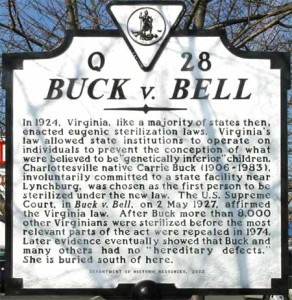 The more you know about the early 20th Century progressive movement, the less you will probably love it. My colleague Trevor Burrus explores the story of Buck v. Bell, the 1927 case in which a eugenics-influenced U.S. Supreme Court approved a Virginia compulsory sterilization law.
The more you know about the early 20th Century progressive movement, the less you will probably love it. My colleague Trevor Burrus explores the story of Buck v. Bell, the 1927 case in which a eugenics-influenced U.S. Supreme Court approved a Virginia compulsory sterilization law.

2 Comments
“Progressive” seems to be used as a slur by Mr. Olson. Just like Democrats and Republicans, and even conservatives and liberals, the definition of what they are about changed over time. I write this to distinguish between the Progressive movement of last century and those who call themselves progressives today.
The eugenics branch of the Progressive Movement was a conservative movement, as much as anything else. According to Wikipedia, conservatives of the time supported eugenics. I would be hard pressed to blame it all on non-conservatives, especially since the Buck case evolved in rural Virginia, hardly a bastion of progressive thought as we see it today. Saying that eugenics is “progressive” as we understand it today is like saying that the anti-abortion is progressive. It is like saying that the excessive punishment of criminals today is progressive. All are/were movements encouraging the state to use coercive measures to produce a “public good.”
A note: the most anti-eugenic source seems to have been the Catholic church, who opposed it on moral grounds.
Certainly, eugenics seems to be antithetical to libertarian beliefs. I would put that movement (and the others), under the term “statist.”
That said, rightly or wrongly, many of those who supported eugenics in the 1920s, such as Margaret Sanger, fashioned themselves as “progressives,” and might be called liberals today. Other supporters included presidents who would not call themselves progressives today, such as William Taft, Theodore Roosevelt, and Herbert Hoover, as well as Winston Churchill. Certainly, the pseudo-science of Nazism was progressive in a fashion, and many American conservatives in the 1930s supported the movement. (I know about Godwin’s law, but this is a case where a Nazi comparison may actually be appropriate).
Certainly, eugenics seems to be antithetical to libertarian beliefs. I would put that movement (and the others), under the term “statist.””
True that. Eugenics is not needed in a libertarian environment, as the weak and feeble minded were on their own, and not a burden to the State.
The conservatives of that era pressing for eugenics were feeling the negative economic effects of those they felt needed the eugenics sorting out.
Liberals don’t need eugenics, because there is always a never ending supply of someone else’s money to spread around.